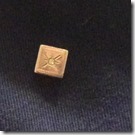
What Makes Something Sacred?
 1st in the series, “Religion, Rites & Rituals” First Baptist Church, Frederick, Maryland, July 17, 2016
1st in the series, “Religion, Rites & Rituals” First Baptist Church, Frederick, Maryland, July 17, 2016
“I’m interested in God, but not religion.” It’s a phrase we hear over and over again, but what does it even mean? Is religion simply something we created? A tool for controlling and dividing?
Some believe so. Some even take it as far as to suggest that Jesus was against religion. They even propose that religion has caused so much pain and division in the world that it should just be thrown out.
But should it? We can’t deny that religion has had a storied past, but is that really all there is to it? Or could there be more? Are there sacred moments inside its rites and rituals?
For the next six weeks we ask the hard questions and look inside the rites and rituals of religion. We begin today with the question, “What makes something sacred?” Let’s read from Isaiah 44:10, 14-18:
Who would fashion a god or cast an image that can do no good? …He cuts down cedars or chooses a holm tree or an oak and lets it grow strong among the trees of the forest. He plants a cedar and the rain nourishes it. Then it can be used as fuel. Part of it he takes and warms himself; he kindles a fire and bakes bread. Then he makes a god and worships it, makes it a carved image and bows down before it. Half of it he burns in the fire; over this half he roasts meat, eats it and is satisfied. He also warms himself and says, “Ah, I am warm, I can feel the fire!” The rest of it he makes into a god, his idol, bows down to it and worships it; he prays to it and says, “Save me, for you are my god!” They do not know, nor do they comprehend; for their eyes are shut, so that they cannot see, and their minds as well, so that they cannot understand.
A Tie-tack and Timmy
Walter and Adele Latimer were my great-grandparents on my mother’s side. We never lived closer than six hours from them so I didn’t get to know them well, but I knew them. Unlike my dad’s grandparents, who were gone by the time I was born, Mama and Papa lived well into my childhood. When we went to Biloxi once a year, we’d stay with them in the old house on Renoir Street. My mother grew up across the street from them and spent as much time at their house as at hers, so this was natural.
Mama died when I was in fifth grade, Papa two years later, and there are two things I have that keep me connected to them. When I was three Mama gave me a stuffed chimp that at some point I named Timmy. At first he was just a toy, then he became something of Linus’ blanket—something more than a toy. I didn’t drag him around with me all the time, but I did take Timmy to college, and I snuck him on our honeymoon.
And he sits on my dresser in the bedroom.
 After Papa died when I was in the seventh grade, my great-Aunt gave me one of his tie-tacks. It’s just a simple tie-tack, a small silver square with a small diamond in the middle.
After Papa died when I was in the seventh grade, my great-Aunt gave me one of his tie-tacks. It’s just a simple tie-tack, a small silver square with a small diamond in the middle.
Back then even teenagers wore ties to church, and on the basketball team we had to wear ties to school on game days, and I almost always wore that tie-tack. As I got older I got other tie-tacks and tie-bars, but I still like to wear Papa’s tie tack. I wore it to church two weeks ago.
These are objects that connect me to people I still love but can’t touch. Their value is nothing to others, because in and of themselves they are of no value. But to me they are most valuable, they are irreplaceable. And when I am gone I will pass them on to my children. Angela has claimed Timmy; Austin will get the tie-tack.
What makes something sacred?
Wood Became Idols
In Isaiah 44 the prophet mocks idol worshipers who take a piece of wood, and some of it they use to make a fire to cook over and warm themselves, and some of it they use to make a god that they worship and ask for help and deliverance.
This marks the final step in Israelite religion’s understanding of other gods. In the beginning they acknowledge that there are many gods, and Yahweh is one of them that they will worship and bring sacrifice to. Soon they progress to an exclusive relationship. They worship Yahweh alone, but they believe in other gods. Yahweh is just one of many gods, one that they have a special relationship with.
Then they progress to Yahweh being chief among the gods, the strongest, fiercest of the gods, the one who wins battles and who demands absolute allegiance and fidelity over all the other gods. But he is very much tied to the land, to their land, the Promised Land of Israel.
Then they begin to see that Yahweh isn’t tied to the land at all. He is creator God, and can be worshiped even when they are exiled in Babylon.
Finally, they come to believe that he is the only god, and all the others are made-up gods who don’t exist in reality but only in the minds and hearts of their followers who deceive themselves.
The Israelites were forbidden to make images of stone or clay or wood of Yahweh, but that is not because sacred objects are in and of themselves wrong. Rather, it is because of the tendency humans have of misunderstanding why an object is sacred.
The mistake that the idolaters made was in thinking that the object was the real thing, that the object was more than just a means of connecting to the real thing but is itself the real thing.
Not that the wood idols they made were actually the gods—we tend to see ancient people as unsophisticated rubes whose beliefs were primitive and crude, and they weren’t anymore primitive and crude as we can be.
But they believed that, in physically representing the gods the objects participated in the divine nature themselves; they shared something with the god that made them somewhat divine themselves.
Isaiah comes along and says, “Nope, they are still just wood, nothing more.”
Before you look down your noses at them, let me note that a lot of Christians do the same thing.
I’ve seen Christians do it with hymnbooks, or with worship music. I’ve seen them do it with church buildings and church polity. You can’t touch them because they have become more than sacred—to some people they almost touch on the divine.
I think the way a lot of Christians view the Bible is akin to this. They so revere the Bible, the Holy Bible, that the book itself almost becomes divine, just a little lower than the Trinity itself.
The Bible is holy not because it is divine but because God uses it to provide a connection between him and his children.
We should never confuse the sacred object with the God connects us to. The idol makers claim that the idols are sacred in their origins, which he points out is ludicrous.
However, there is a reality that Isaiah is pointing to: we take ordinary objects or actions and use them to connect us with God. It is their ability to connect us with God, however, that makes them sacred, not their origins.
God-Breathed Clay, God-Breathed Stories.
This is exemplified in the second creation narrative in Genesis 2. God takes a lump of clay, fashions it into something that looks like a human but is still just an ordinary lump of clay. Then he breathes into it and it becomes alive. It becomes a human. What makes it human is not the clay, but the God-breath. That is the connection.
So also the stories that make up the Bible. They are great stories, most of them, but they weren’t originally written to be Scripture or sacred or holy.
One of the things that my Bible study classes are seeing is how many of the stories were written without the purist of motives. In the Old Testament in particular most of the stories were told to advance a certain political viewpoint, to advance one group’s agenda over another group’s agenda.
There are stories written to advocate that the priesthood should be the highest authority in the land. There are some that are written to say that priests descended from Aaron are superior to all other priests, and others written to say that priests descended from Moses are better than all other priests.
You have stories that support the monarchy, and stories that oppose the monarchy.
You have stories that say that foreigners are evil, unclean and a that righteous person will separate from them, and you have stories that welcome the foreigner because the Israelites were once aliens in a foreign land and were mistreated, so they should never do the same thing to another.
You have stories that say that if something bad happens to you it’s because you sinned, and others that say “Not so fast.”
You have still others that say that if something bad happens to you it’s because you are being faithful to God in the midst of a world that has rejected God.
You have all this clay, and in some ways it’s a mess. And then God breathes into it, and somehow it all works together to show us the will of God and to connect us to him personally.
And it’s that connection that makes the normal clay sacred clay.
Ordinary Days and Sacred Days
We actually do something similar all the time, this taking of ordinary things and making them sacred. Take days for instance. In reality there is no difference between a Monday and a Thursday. The sun rises, the sun sets, light comes, then darkness, followed by light, followed by darkness, in 24-hour cycles.
Some days it rains, some it’s clear, some hot, some cold. A day is Tuesday not because Tuesday is a thing but because we make it a thing, a Tuesday thing. It’s the second day of the work week, unless you are a fire fighter and are two days on and two days off or whatever their schedule is.
For pastors the second day of the work week is Monday. Thursday is my Friday.
You hear about workaholics who spend all their time at the office, even sleeping there, and sometimes they aren’t even sure what day it is. Is it Monday, or Saturday? They don’t know.
That’s because all days are the same.
If you are a slave in Egypt every day really is the same, because every day it’s the same thing over and over.
Get up, make bricks, go to bed. Rinse and repeat.
When they Israelites were freed they said, “No more. One day a week we rest from work. We won’t even make our donkeys and oxen work. This day will be different from all the rest.”
And that changed all the days, because now you had The Day Before The Day of Rest, and work was a little easier because it was The Day Before The Day of Rest.
Of course you also had The Day After The Day of Rest, but even that was better than before because you were rested, a little renewed and revived.
And because there was now The Day of Rest, there was a Hump Day.
Every day became different because one day was made different. Special. Sacred.
Last week when I got home from church there was a package that had been delivered to my front porch. I thought, well, that guy who delivered this is like me; his Day of Rest is different too.
Used to be that everyone’s day of rest was the same day, but that ship sailed when we wanted to go to restaurants and buy gas and go shopping on Sunday. But at least everyone gets one.
Except poor people who work two, three days a week to try to make ends meet don’t ever get that day. Those of us with enough money get to enjoy a Sabbath, but the Sabbath was made for the sake of slaves, and yet the working poor often don’t get their day. For them, even though every day is different, it’s the same.
Bread Becomes Body, Wine Becomes Blood
Once a month we take ordinary bread and cut it up. It’s really just ordinary bread. Growing up we used unleavened bread for communion. Saltines without the salt. It was the only time I ever ate crackers without salt, so I guess it was special bread.
But we just use white bread. Someone goes to the grocery store, buys white bread that is used to make peanut butter and jelly sandwiches, and they take it home cut it up into squares, bring it to church in bags, and place it on plates.
Then I hold up that piece of white bread and say, “This is my body which was broken for you,” and we eat.
For some that bread connects them to God. For others it’s just something we do on the first Sunday of the month.
Who makes it special? What makes it sacred? The plate it’s put on?, My words? Does God make that white bread anything more than white bread?
No, you make it sacred.
Or not, depending on your connection to God.
It’s the same thing with the juice. We use Welch’s, I think. Welch’s was first made so that Baptists didn’t have to use wine for communion. Did you know that?
But it’s still just Welch’s grape juice, the same as some people drink at breakfast.
You decide whether it becomes sacred.
Cross Becomes Cause
The cross was always just a cross until Jesus was crucified, and now it’s a symbol of a cause characterized by the non-violent defiance of evil, by sacrifice, obedience, forgiveness, and love.
Or it’s just a couple of pieces of wood attached perpendicular to one another.
You decide.
God-sightings
Last week we heard our youth talk about God-sightings at MissionFuge and ReCharge. Becky told about Tim being welcomed by all the kids at ReCharge.
For some it was just kids being nice to someone with Autism who is our Student Pastor’s kid. Nice.
But to Becky it was a God-sighting; it connected her with God and became a sacred moment.
We will always have sacred moments and sacred objects because there is a God and we want to become connected to him; we need to be connected to him. Like with MaMa and PaPa, we love him but can’t touch him and embrace him and hear him with our outside ears, so turning the ordinary sacred is a necessary part of connecting to him.
They are not the real thing themselves, but they do connect us to the Real Thing.
And they connect us to him not only because we need to be connected to him, because he wants to be connected with us.
And that is Good News.
Opening photo by © Can Stock Photo Inc. / pkproject
 I am a lifelong student of the Bible, and have been a pastor for over twenty-five years. My desire through this blog is to help people see things in the intersection of Scripture and real life that they might have missed. The careless handling of the Bible is causing a lot of problems in our churches and our culture--and is literally turning people away from the church, and, sometimes, God. I hope to treat Scripture with the respect it deserves, and, even if you don't agree with what I say, give you some insight.
Feel free to leave a comment. I promise to respond to you. All I ask is that you be respectful in your comments.
I am a lifelong student of the Bible, and have been a pastor for over twenty-five years. My desire through this blog is to help people see things in the intersection of Scripture and real life that they might have missed. The careless handling of the Bible is causing a lot of problems in our churches and our culture--and is literally turning people away from the church, and, sometimes, God. I hope to treat Scripture with the respect it deserves, and, even if you don't agree with what I say, give you some insight.
Feel free to leave a comment. I promise to respond to you. All I ask is that you be respectful in your comments. 
Connect with Me